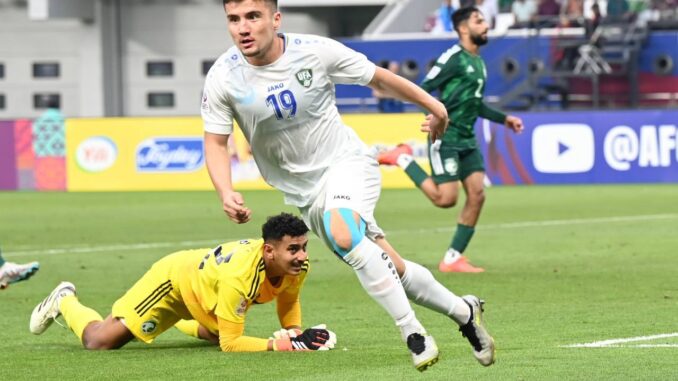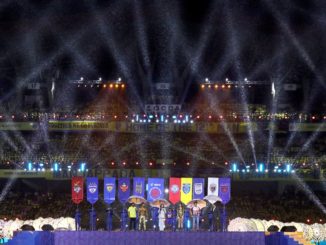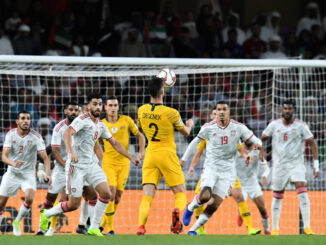
Professional, composed, effective.
Some of the superlatives used to describe an unerringly comprised, potentially historic victory for Uzbekistan as they moved one step closer to an Olympics debut; one step closer to breaking their eternal bridesmaid curse.
Their 2-0 win over reigning AFC U23 Asian Cup champions, Saudi Arabia, ensures them a place in the semi-finals of the competition for the fourth time in succession. What’s different this time is that they have not one, not two, but three chances at guaranteeing a place in Paris this coming summer.
Victory over Indonesia in Monday’s semi-final would provide direct passage to the Olympics. Defeat would still offer a bronze medal match-up to make the top three in Asia heading to France. Further defeat even allows for an intercontinental playoff with Guinea for the final back door ticket to the tournament.
Irrespective of the contingencies, Uzbekistan have a clear case to go all the way to the final and qualifying as Asian champions outright.
Their quarter final match-up with Saudi Arabia could well have been the tournament’s final, as it was two years ago in Tashkent, if their opponents hadn’t taken their foot off the pedal in their final group match against Iraq.
From the first whistle, Uzbekistan showed maturity. In a heated and raucous atmosphere, it was the Uzbek’s that coolly executed their gameplay, while the Saudis all too often lost their cool.
How the tables have turned.
Five years ago, Uzbekistan squandered a 2-1 lead in World Cup qualification to the Green Falcons with five minutes to go, going on to lose 3-2.
Defeat for the Saudis, in poignantly the last match before COVID, would’ve derailed their hopes of qualification for Qatar 2022, and with it the job security of Herve Renard. Without such a turnaround, there wouldn’t have been the famous Argentina scalp some three years later.
The deciding factor at the time was a reversion to type. Uzbekistan, heady with enthusiasm and naivety became nervy under pressure, and the Saudis took full advantage. One could’ve quite cruelly observed this was a proper footballing team merely toying with a hapless pretender.
Shrugging off their nearly-men caricature has become harder and harder. Near misses in World Cup qualification, Olympic qualifiers and earlier this year at the Asian Cup, continue to linger over Uzbekistan, as some sort of curse that has come to define their progress.
In football, however, curses can be broken.
Their Saudi adversary, that continued to bite them at club, international and youth level, was cracked last year; progress to the U17 Asian Cup and Asian Games semi-finals with victory over Saudi Arabia in the last eight. Could lightning strike thrice at the U23 Asian Cup?
It’s no fluke, nor merely a change in mentality, but demonstrably the gap in quality between the pair from 2019 to now, has clearly narrowed, ironically at a time where Saudi domestic football is competing at its highest level.
At its expense international football has taken a sizeable hit. Roberto Mancini’s dressing room collapse in Qatar may have been instigated by individual bust ups, but a lack of playing time, on average, at domestic level probably destabilised the squad’s preparations the most.
At U23 level that’s been further pronounced. Two years ago, player of the tournament Aymen Yahya was just bursting onto the scene with Al Nassr, but has barely featured for them since, with only four starts this season to his name, in the shadow of Cristiano Ronaldo and Co.
A handful of the Saudi starting lineup could truly claim to be regular starters for their clubs. For the Uzbeks, most could credibly attest to being one of their club side’s most integral players, let alone a regular starter.
The Uzbek Super League’s suspension for two months for the duration of this tournament may look like a charitable PR stunt to support the national team, yet in reality the league would’ve been played at half pace without those who travelled to Qatar.
Over in the Saudi Pro League, few have even realised anyone has left.
On top of a solid core, Uzbekistan called on five players currently plying their trade in Europe and a further three who had experience of playing there in the last two years. Saudi Arabia couldn’t muster even one with comparable experience.
When the crucial moments came, it was by no surprise that Abbosbek Fayzullaev, currently ripping it up with CSKA in Russia, slotted in former Alania striker Khuisayin Norchaev for the opener, before Rubin Kazan’s Umarali Rahmonaliev finished it off in the final 10 minutes.
Embed from Getty ImagesMomentum is everything, but it’s taken long-term planning and consequence to get to this point. The UFA’s foresight to embrace youth football early, in prioritising development camps that flew around the world for top level exposure, and in constructing an Olympic-proxy club side in the domestic structure to guarantee minutes and generate a winning style, has been the bedrock of this team’s success.
Exposure breeds results, and that starts early. It’s no coincidence that seven of this squad played at last year’s U20 World Cup in Argentina. As the aforementioned Fayzullaev told The Asian Game last year: “It was incredible to play in the (U20) World Cup. We gained so much experience and I think it will help us in the future.”
Let’s be honest though, the lack of money in Uzbek football has also inadvertently helped progress. The likes of Mukhammadkodir Khamraliev and Diyor Kholmatov, slow developers even a year or two back, are now leading figures for Tashkent giants Pakhtakor.
While they’re starting to illustrate their full potential for the reigning champions this season, the trust shown in them has come out of necessity rather than choice as the club makes significant financial cutbacks in favour of youth, a trend mirrored up and down the league.
By luck, or judgement, Uzbek football stands on a precipice. We’ve been here before, we’ve seen the them live up to their infamous billing time and time again, but this time, the stars are starting to align.
Paris awaits in the coming months, with the World Cup in North America the next staging post in their development to come. This remarkable rise from nearly men, to spearheading the bright future of Asian football, is one rocket ship to the moon we’ll all enjoy riding over the coming years.
Photo: UFA




